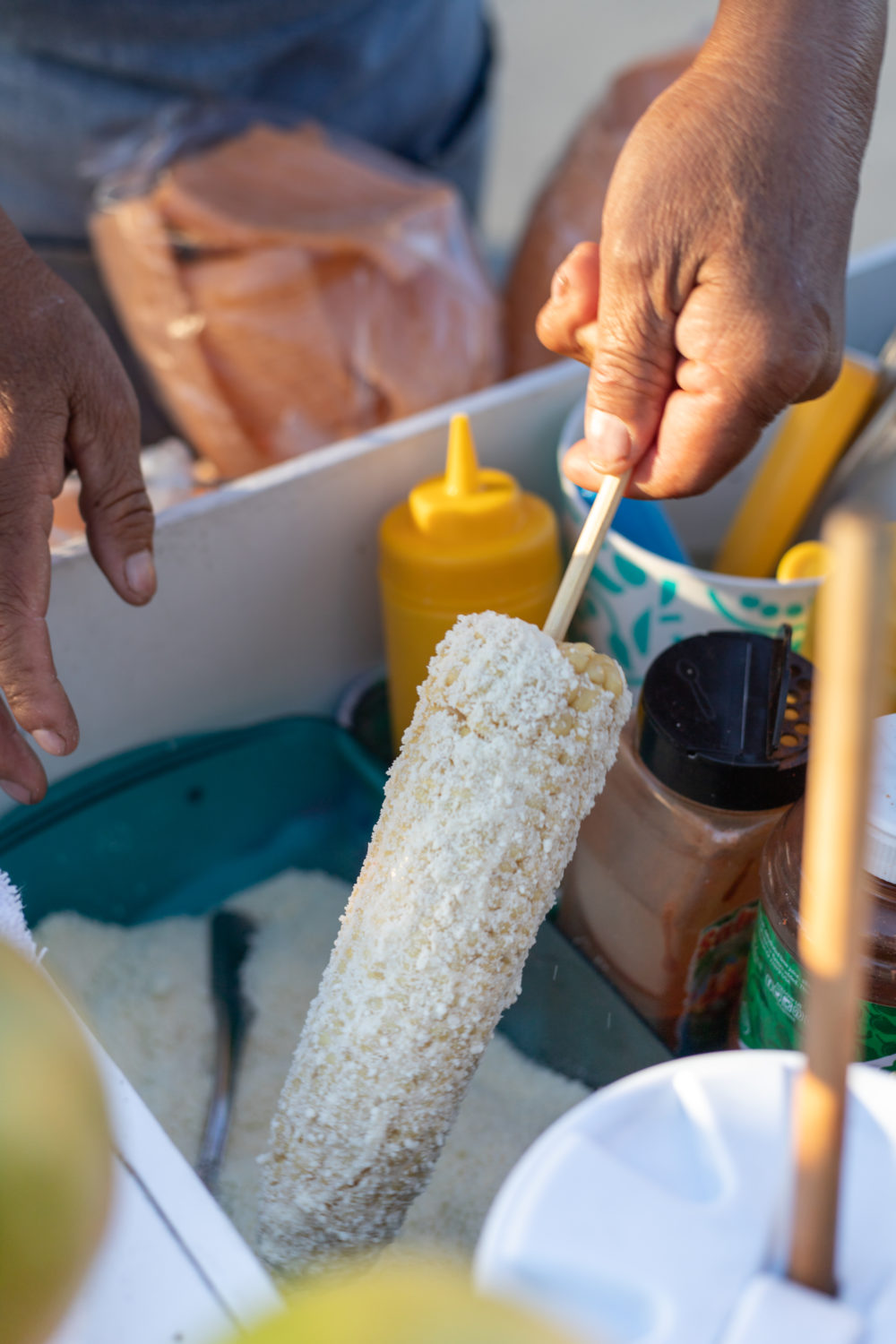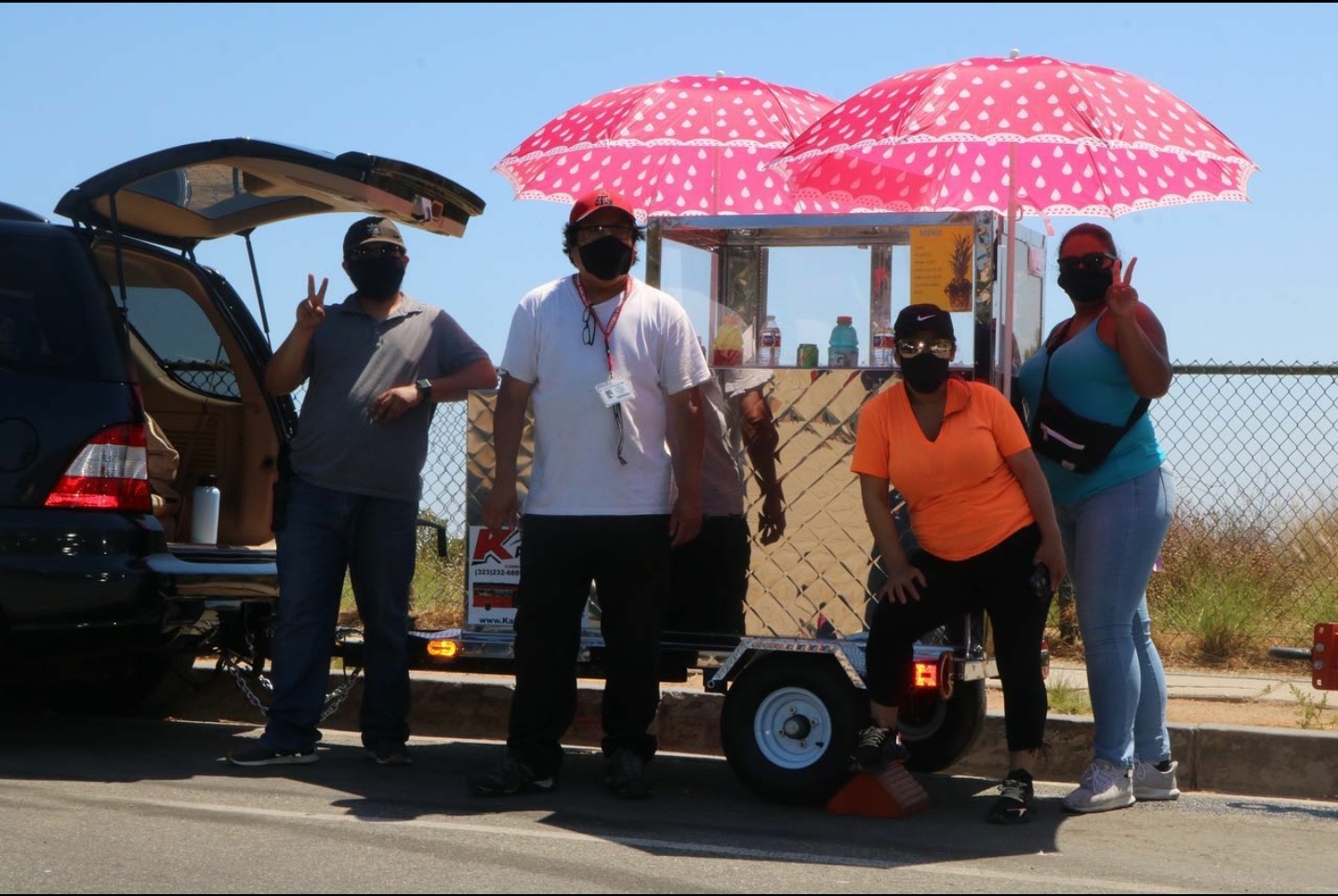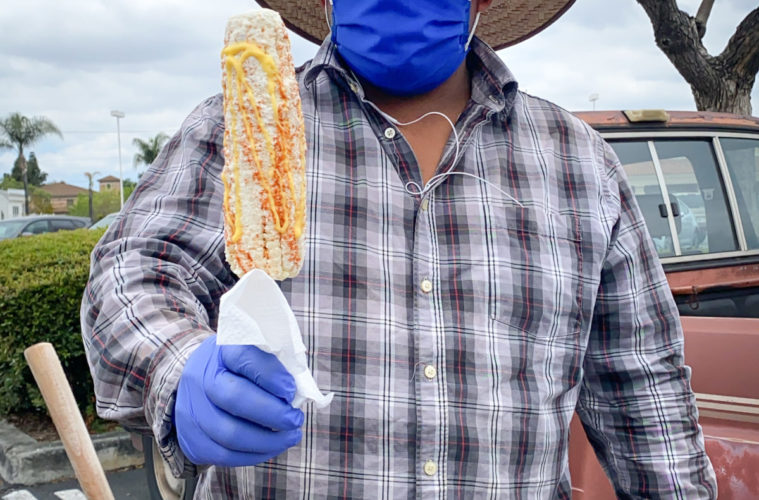A recent trend of violence toward migrant sidewalk food vendors has emerged in the U.S. — particularly in areas with large immigrant populations, such as L.A. Several cases have found these sellers robbed, beaten and in some instances even killed.
Most recently, a June 30 incident in Long Beach saw two armed men beat and rob a 50-year-old street vendor named Bilifo Fernandez, as they then pulled out guns and pointed them at witnesses. The incident was caught by a nearby Ring security camera and authorities are reportedly still searching for the suspects.

(Photo by Jorge Ortega)
These vendor incidents have not always been recorded on video; however, the use of cameras have recently made people more aware that it is happening.
“It’s nothing new to me,” said Mario “Scar” Ponce, best known for the “Cholos Try” YouTube series. “All this stuff on social media they keep showing about street vendors being harassed, getting bullied, it’s nothing new. Now we have cameras, so everybody gets to see what’s going on in today’s world.”
View this post on Instagram
Ponce helped organize a Griffith Park hike in support of vendor Aguilar’s Fruit in Hollywood, who he said was being “harassed by the community” in the Hollywood Hills. The video of the hike garnered more than 6 million views through different social media channels and directed attention to the issue of sidewalk vendors being targeted for abuse.
The community action also highlighted immigrant sidewalk vendors and their legal statuses in the U.S. Ponce’s video showed people driving up to the Aguilar’s Fruit stand, calling them “illegal” and continuously asking if they have a license to sell.

Photo courtesy of Aguilar’s Fruit
With the legalities of sidewalk vending being a point of contention with Los Angeles Public Health, in 2017 Los Angeles legalized sidewalk vending. The L.A. City Council passed the ordinance with an 11-2 vote making the practice legal, but with permits issued by the Board of Public Works.
“We cannot continue to allow an unregulated system that penalizes hardworking, mostly immigrant vendors with possible criminal misdemeanor charges, particularly in the current political environment,” then Councilman Jose Huizar said after the motion passed. “These people are not asking for a handout, they are asking for an opportunity to lift themselves up and provide for their families.”
The council later implemented vending fees, which are $541 as of July 1, 2020, but has yet to decide how its rules would be enforced.
In L.A. and across the state, some, however, have taken enforcement into their own hands. On July 5, a video was posted of a man confronting an elotero who was selling from his cart at Hart Park in Bakersfield. The man, later identified as Davo Larranaga, was recorded by the vendor’s daughter, as Larranaga told the family, “You’re taking food from my daughter’s mouth. Is he paying for a permit? Is he? Yes or no?”
View this post on Instagram
Larranaga operates a Snowie Shaved Ice truck, and when the company heard of the incident they made it clear that Larranaga was not an employee, as they sell to independent contractors. They added that they would be “looking into the agreement of his contract.”
After the incident was posted on social media, South L.A. rapper King Lil G got ahold of the elotero and his family donating $1,800.
“We gotta keep looking out for each other,” King Lil G said on Instagram. “I am very aware that one gesture won’t stop our people from going through this type of nonsense, but at least we are all aware that we have to look out for one another especially when our innocent street vendors are being targeted.”
In Austin, Texas, a recent street vendor incident turned fatal as 68-year-old Adelaido Bernabe Urias was shot and killed while selling ice cream, or “paletas,” near an Austin apartment complex.
The robbery occurred at 3:10 p.m. in broad daylight. Residents heard two gunshots and later found Urias lying on the ground. Austin’s homicide division said that Urias was likely targeted because food vendors often carry cash, according to KXAN.
The killing of Urias sparked anger within the Chicano community, as his incident combined with other shootings, stabbings and general harassment of migrant street vendors struck a chord with Mexican Americans who grew up eating “paletas,” “elotes” (corn on the cob), hot dogs, fruit and other foods that are sold through mobile carts.
Videos then started circulating of vendors being escorted by people with guns, vowing to “protect” them.
More and more videos of street vendor incidents have been posted online, many ending in violence, but in the case of Kenia Barragan, she posted a video of a southern California tamale vendor, who she approached and gave $50 to. The 94-year-old man named Jose Villa erupted in tears, as the gesture was overwhelming to him. Barragan then created a GoFundMe in support of the man, raising more than $80,000 as of this writing.
“… He’s 94 years old and uses a wheelchair to get around,” Barragan wrote in the fundraiser’s description. “He can barely afford to buy his coffee and bread in the morning to eat, and doesn’t have money to pay for a phone, let alone his medication. I gave him my number and told him to call me whenever he needs anything… this breaks my heart.”
View this post on Instagram
Sidewalk food vendors have become part of Los Angeles culture over the years, as you roam the streets of South L.A., East L.A., downtown L.A., and many cities in the county, you can find a food cart on any given corner. Communities have rallied around them, but only time will tell if the violent incidents will stop.
“You can’t have a neighborhood without the street vendor,” concluded “Scar” Ponce. “Just come out and support your local street vendor… just know that you’re doing something good in your heart.”
Advertising disclosure: We may receive compensation for some of the links in our stories. Thank you for supporting LA Weekly and our advertisers.

